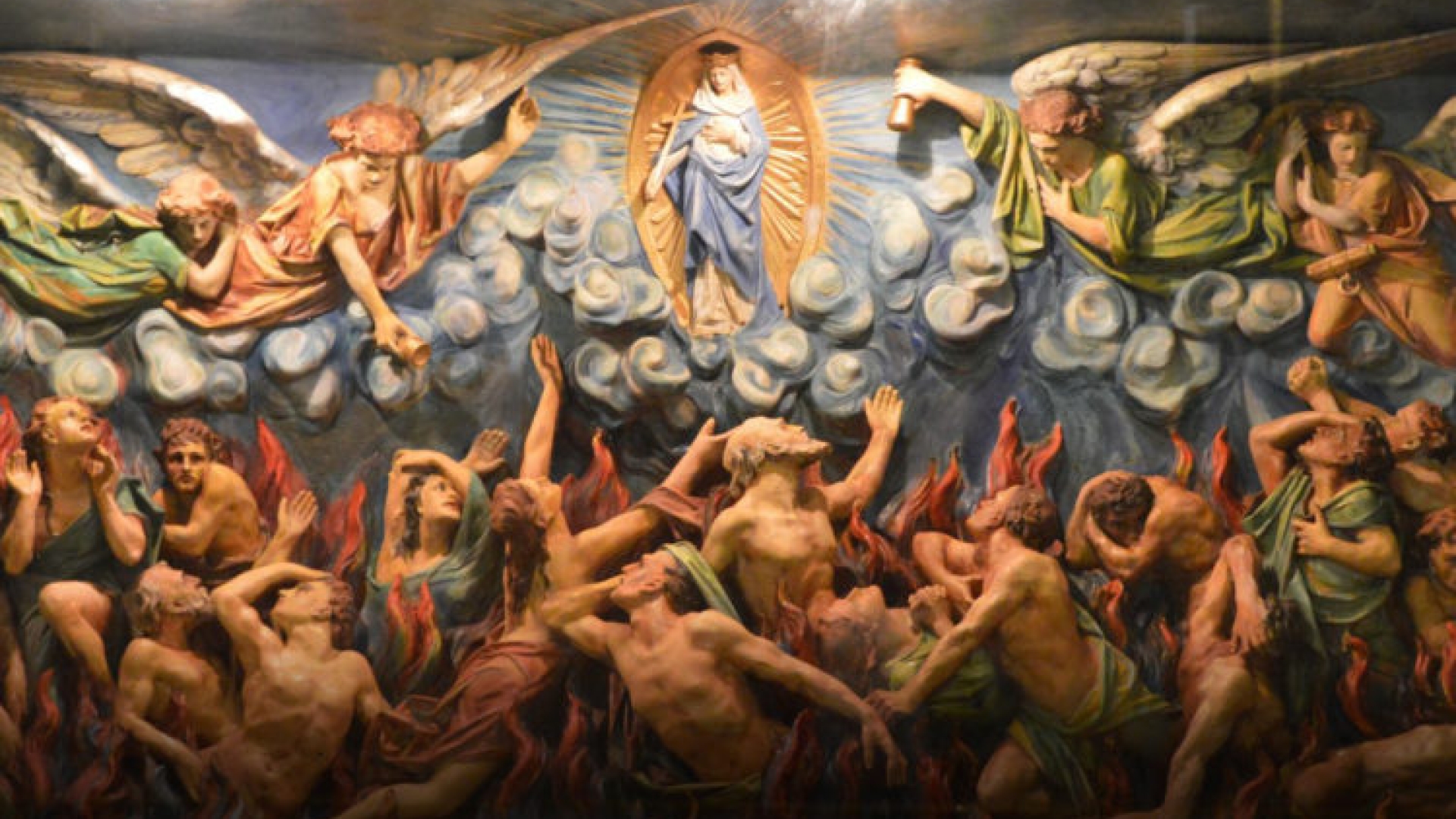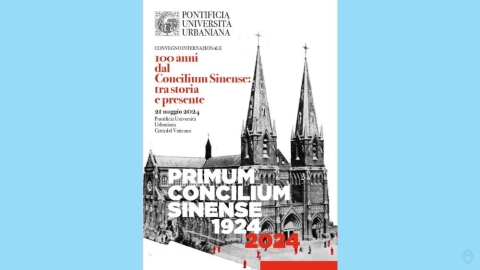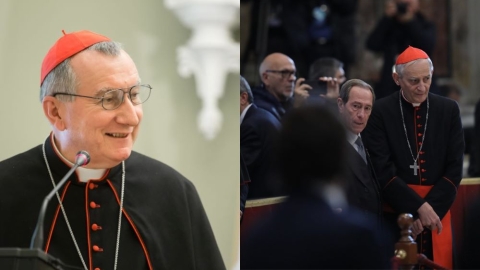Does Purgatory Exist?

In this month of November, the Church invites us to pray for the dead. After having celebrated all the saints in Heaven, we look with compassion on the souls in Purgatory. But what about Purgatory? Does it exist, where is it, what is going on?
We thank Fr. Louis-Marie Carlhian, of the Society of Saint Pius X, for answering these questions.
Is Purgatory a Theory of Medieval Theologians?
This is the classic accusation made by orthodox schismatics and rationalists ... Yet the existence of Purgatory is a dogma of faith, always believed in the Church, and traces of which can be found in Scripture. Indeed there is mention of prayers for the deceased. However, if the deceased are in Heaven, there is no need to pray for them, neither if they are in Hell, since the sojourn in these places is final! The practice of these prayers and these sacrifices is therefore a sufficient sign to establish the belief in an intermediate place between Earth and Heaven, from which one can be delivered by prayers. This point was defined by the councils of Lyon, Florence, and Trent.
Does Purgatory Appear in Sacred Scripture?
The second book of the Maccabees relates that, in the aftermath of a battle against the Syrians, Judas Maccabee discovered under the tunics of his soldiers killed during the battle, idols resulting from the plundering of Jamnia. This was a violation of the law of Moses, and Judas judged the death of these men to be a chastisement of God:
“Then they all blessed the just judgment of the Lord, who had discovered the things that were hidden. And so betaking themselves to prayers, they besought him, that the sin which had been committed might be forgotten. But the most valiant Judas exhorted the people to keep them-selves from sin, forasmuch as they saw before their eyes what had happened, because of the sins of those that were slain. And making a gathering, he sent twelve thousand drachmas of silver to Jerusalem for sacrifice to be offered for the sins of the dead, thinking well and religiously concerning the resurrection, (for if he had not hoped that they that were slain should rise again, it would have seemed superfluous and vain to pray for the dead). And because he considered that they who had fallen asleep with godliness, had great grace laid up for them. It is therefore a holy and wholesome thought to pray for the dead, that they may be loosed from sins.” (2 Mac 12:41-46)
In the New Testament, the existence of Purgatory is nowhere explicitly stated. However, there are several allusions to a state of purification that is not hell: “And whosoever shall speak a word against the Son of man, it shall be forgiven him: but he that shall speak against the Holy Ghost, it shall not be forgiven him, neither in this world, nor in the world to come.” (Mt. 12:32)
Did the Early Christians Believe in Purgatory?
The first Christians celebrated the Holy Mysteries around the tombs of the martyrs. Very early on, they prayed for those who, not being martyrs, would have need of suffrages. Thus the Acta Joannis, around the year 160, speaks of St. John praying over a tomb and celebrating the fractio panis on the third day after the death of a Christian. St. Augustine saw it as a universally practiced use, St. John Damascene traces this tradition back to the Apostles, Dionysius also ensures that we pray for the deceased. Here we can apply the theological principle: “Lex orandi, lex credendi” (the law of prayer is the law of belief, because it is a sure testimony of the belief common to the whole Church).
Where is Purgatory Located?
Neither Sacred Scripture nor Tradition gives us precise information on this subject. They speak of “Hades,” a Latin expression meaning the lower places, the underworld, where pagan beliefs placed the hereafter. Christian Tradition uses this expression to oppose Heaven, which is above and Hell, which is below. They have distinguished several different places: the Hell of the damned, the Limbo of Children who died without baptism, the Limbo of the Patriarchs, and Purgatory. But are these places strictly speaking, since those who are there are deprived of their bodies? Theology is cautiously silent on this, pointing out that the answer has no bearing on our salvation.
Since we are redeemed by the superabundant merits of Our Lord, what good is a new purification?
The satisfaction offered by Our Lord on the Cross is of course more than sufficient to redeem all our sins. However, there are two aspects to be considered about sin: on the one hand, the disobedience to the Creator, on the other hand, the unregulated attachment to the creature. If the first aspect is fully repaired through contrition and confession, by virtue of the merits of Our Lord, the second must be by our contribution. God thus allows us to participate in our own redemption. Does not St. Paul declare: “I complete in my flesh what is lacking in the Passion of Jesus Christ”? In other words, it remains for us to expiate our attachment to the things of this earth, which prevents God from fully reigning over our soul. If we are rid of heavy faults incompatible with the love of God, there are still imperfections in our soul to be removed: venial sins not subject to confession, temporal penalties due for accused mortal sins, or remains of incompletely conquered vices. Theology readily compares this purification to a fire which cannot consume heavy material, but destroys the “straw” or “dross” remaining in the soul. This atonement takes place either on this earth, through good works, or in Purgatory.
We may add that it would be improper for God to treat all souls either as saints or as the damned. It makes sense that there is an intermediate state for those who have not atoned for all of their sins. Even some pagan peoples admitted the existence of a temporary punishment after death.
What Are the Penalties in Purgatory?
“There are two penalties in Purgatory: the pain of loss, the postponement of the beatific vision; the pain of sense, the torment inflicted by fire. The slightest degree of either surpasses the greatest pain one can endure here on earth” (St. Thomas Aquinas, Summa Theologica, IIIa Pars, Q.70 A.3). Our soul, on leaving this life, feels a violent desire to be united to God, because it is no longer limited by the body and glimpses the immensity of Heaven’s happiness. The torment it feels from the pain of damnation is then terrible, and is only tempered by the certainty that it will end. As for the pain of sense, it reaches the soul directly in the sensitivity it gives to the body, and is felt all the more keenly.
However, the pains of Purgatory are very different from those of Hell, because they purify souls instead of punishing them. Souls in Purgatory have the virtues of hope and charity, unlike the damned. They therefore have a great desire to be united with God and accept the penance inflicted on them as a means of salvation. This penalty being imposed by God, the souls cannot accept it freely, because such would make it a means of merit. Charity does not increase in them, but, as the obstacles which yet prevent it from having its full effect diminish, they feel it more and more keenly as they approach salvation.
Should We Help the Souls in Purgatory?
We have a duty to help the deceased who are waiting to enter Heaven:
- it is an act of charity that touches the souls loved by God;
- these souls can pray for us once they enter Heaven;
- we are sometimes responsible for the sins committed on this earth by the deceased;
- we should especially pray for our loved ones and our family.
The Church has always addressed her supplications for the souls of the deceased in the most urgent and official manner: the Memento of the dead, in the Canon of the Mass, makes us pray every day that the deceased find “a place of refreshment, light, and peace.” Mass is therefore the first and most effective means of relieving them, by offering the Holy Sacrifice for them or simply by offering communion for them. The Church also opens the treasury of indulgences for them. Finally we can offer the great works of the Christian life, prayer, fasting, and alms. These are called the suffrages. The reason is that these souls are united to us through the Communion of the Saints, that is to say by union in Our Lord through charity. Just as members of the same body can support one another, so members of the Church can communicate some of their merits with each other.
Can We Ask for Graces from the Souls in Purgatory?
As we have just said, these souls are united to us by charity and can pray for us. God in His mercy can inform them of prayers being made for them or of the needs of those close to them, and, once in Heaven, they are certainly aware of it. However, they can no longer merit, and as St. Thomas points out to us, they are in a state where they need our prayers more than they need to pray for us. We can also add that the Church never addresses them in liturgical prayer. It is therefore possible to pray to them, but without giving them a power superior to the saints in Heaven!
Every Christian must seek to avoid Purgatory, not only to avoid its penalties, but also to accomplish the will of God: “Be you therefore perfect, as also your heavenly Father is perfect” (Mt. 5:48). This is possible by preserving ourselves from the smallest faults and expiating through penance the sins for which we have obtained forgiveness.
Source: La Couronne de Marie no.45, November 2016
En quoi consistent les peines du Purgatoire ? Sont-elles très dures ?
« Il y a deux peines en Purgatoire : la peine du dam, l’ajournement de la vue de Dieu ; la peine du sens, le tourment infligé par le feu. Le moindre degré de l’une comme de l’autre surpasse la peine la plus grande que l’on puisse endurer ici-bas. » Saint Thomas d’Aquin, Somme théologique, IIIa Pars, Q.70 article 3. Notre âme, au sortir de cette vie, éprouve un violent désir d’être unie à Dieu, car elle n’est plus limitée par le corps et entrevoit l’immensité du bonheur du Ciel. Le tourment qu’elle éprouve de la peine du dam est alors terrible, et n’est tempéré que par la certitude qu’il finira. Quant à la peine du sens, elle atteint l’âme directement dans la sensibilité qu’elle donne au corps, et se fait sentir d’autant plus vivement.
Toutefois, les peines du Purgatoire sont très différentes de celles de l’Enfer, car elles purifient les âmes au lieu de les punir. Les âmes du Purgatoire possèdent les vertus d’espérance et de charité, contrairement aux damnés. Elles ont donc un grand désir d’être unies à Dieu et acceptent la pénitence qui leur est infligée comme un moyen de salut. Cette peine étant imposée par Dieu, elles ne peuvent l’accepter librement, ce qui en ferait un moyen de mérite. La charité n’augmente pas en elles, mais, comme les obstacles qui l’empêchent encore de produire son plein effet diminuent, elles la ressentent de plus en plus vivement à mesure qu’elles approchent du salut.
Devons-nous aider les âmes du Purgatoire ? De quelle manière ?
Nous avons le devoir de venir en aide aux défunts qui attendent d’entrer au Ciel :
- c’est un acte de charité qui touche des âmes aimées de Dieu
- ces âmes peuvent prier pour nous une fois entrées au Ciel
- nous sommes parfois responsables des péchés commis sur cette terre par les défunts
- nous devons spécialement prier pour nos proches et notre famille.
Depuis toujours l’Eglise adresse ses supplications pour les âmes des défunts de la manière la plus pressante et la plus officielle : le Memento des morts, au Canon de la Messe, nous fait prier chaque jour pour que les défunts trouvent « le lieu du rafraîchissement, de la lumière et de la paix ». La Messe est donc le premier moyen et le plus efficace de les soulager, en faisant offrir le Saint Sacrifice à leur intention ou simplement en offrant pour eux sa communion. L’Eglise ouvre également pour eux le trésor des Indulgences. Enfin nous pouvons offrir les grandes œuvres de la vie chrétienne, la prière, le jeûne et l’aumône. C’est ce que l’on appelle les suffrages. La raison en est que ces âmes nous sont unies par la Communion des Saints, c’est-à-dire par l’union en Notre-Seigneur par la charité. De même que les membres d’un même corps peuvent se soutenir les uns les autres, les membres de l’Eglise peuvent communiquer entre eux une partie de leurs mérites.
Peut-on demander des grâces aux âmes du Purgatoire ?
Comme on vient de le dire, ces âmes nous sont unies par la charité et peuvent prier pour nous. Dieu dans sa miséricorde peut les informer des prières faites pour eux ou des besoins de leurs proches, et, une fois au Paradis, elles en sont certainement conscientes. Cependant, elles ne peuvent plus mériter, et comme nous le fait remarquer saint Thomas, elles sont dans un état où elles ont plus besoin de nos prières que de prier pour nous. On peut aussi ajouter que l’Eglise ne leur adresse jamais de prière liturgique. Il est donc possible de les prier, mais sans leur donner une puissance supérieure aux saints du Ciel !
Comment éviter d’y aller ?
Tout chrétien doit chercher à éviter le Purgatoire, non seulement pour en éviter les peines, mais aussi pour accomplir la volonté de Dieu : « Soyez parfaits comme votre Père du Ciel est parfait. » C’est possible en nous préservant des plus petites fautes et en expiant par la pénitence les péchés dont nous avons obtenu le pardon.
Source : La Couronne de Marie n° 45, novembre 2016





